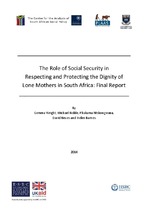The role of social security in respecting and protecting the dignity of lone mothers in South Africa: Final report
Date
2014Author
Wright, Gemma
Noble, Michael
Ntshongwana, Phakama
Neves, David
Barnes, Helen
Metadata
Show full item recordAbstract
This is the final report of a project entitled ‘Lone Mothers in South Africa: The role of
social security in respecting and protecting dignity’. The project was inspired by research
undertaken for the South African Department of Social Development (DSD) about attitudes
to employment and social security (e.g. Noble et al., 2008; Ntshongwana, 2010a and 2010b;
Surender et al., 2007; Surender et al., 2010). During the fieldwork for that programme of
research, participants in focus groups repeatedly made the unprompted point that poverty
eroded their sense of dignity. Given that the South African Constitution declares that people
have inherent dignity and that dignity should be protected and respected (Republic of South
Africa, 1996), we decided to design a project dedicated to exploring the role that social
security currently plays in relation to people’s sense of dignity. Specifically we hoped to
explore whether social assistance, as a financial transfer to low income people, serves to
help to protect and respect people’s dignity, or conversely whether there are ways in which
the country’s social security arrangements serve to undermine people’s dignity.
Currently, there is no social assistance for low income people of working age unless
they are entitled to claim the Disability Grant. There is however a commitment elsewhere in
the Constitution to the progressive realisation of access to social assistance for people, and
their dependants, who are unable to support themselves (Republic of South Africa, 1996:
Chapter 2 section 27). It therefore seemed relevant to explore in addition whether people
thought that – in the context of very high levels of unemployment ‐ some additional form of
social assistance might be a worthwhile poverty alleviation measure that would help to
protect and respect people’s sense of dignity, or whether it might serve to further erode
people’s sense of dignity.

